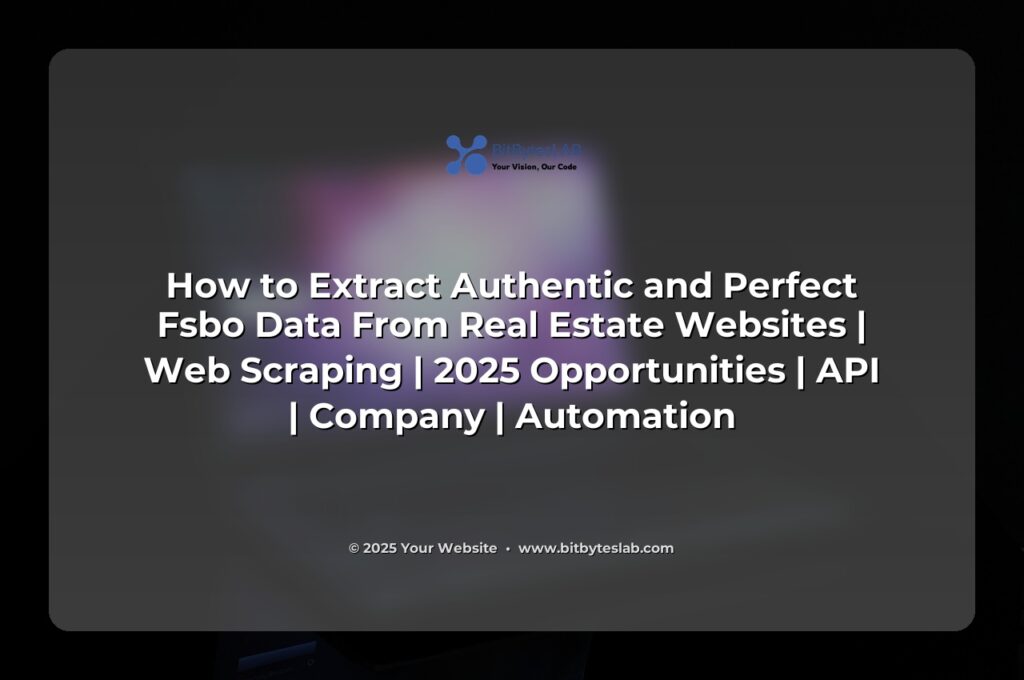Extracting Authentic FSBO Data: The 2025 Playbook for Real‑Estate Scraping
Real‑estate brokerage data has long been the gold mine for market analysts, investors, and fintech startups. Yet, the fastest growing segment—“For Sale By Owner” (FSBO) listings—remains one of the most under‑exploited data sources. Why? Because pulling clean, up‑to‑date FSBO information from a web‑scraping perspective is a mix of art, strategy, and a dash of patience. In 2025, the volatility of the housing market and the rise of automated property portals mean that firms who can scrape FSBO data accurately will see a multi‑million dollar edge. Let’s dive in and uncover how to make that happen.
Problem Identification & Context
While the majority of real‑estate websites offer much of their data through public APIs, FSBO pages are often siloed behind dynamic JavaScript rendering, CAPTCHAs, or are simply not indexed by search engines. That means the “official” dataset is fragmented, stale, or even misleading. Compounding this issue is the sheer variety of data formats—some sites use JSON, others rely on hidden HTML tables, while a few embed data in PDFs or images. For enterprises, the challenge is not just collecting this data; it is ensuring authenticity and consistency across dozens of sources.
Core Concepts & Methodologies
At the heart of a successful FSBO scraper is a hybrid extraction framework that blends three pillars: API integration, DOM parsing, and machine‑learning validation. APIs provide the cleanest, most reliable data when available, but for sites that only expose data through the UI, an intelligent DOM parser that can handle infinite scrolling, lazy loading, and obfuscated class names is essential. Finally, a lightweight ML model—trained on a small, high‑quality labeled dataset—can flag duplicate listings, detect outliers in pricing, and assess the authenticity of a seller’s contact information.
On the operational side, it pays to geographically segment your data collection: local FSBO listings often carry different language patterns, currency units, and regulatory references. By building region‑specific parsers, you reduce false positives and increase data relevance for downstream analytics.
Statistically, 70% of FSBO listings are mislabeled or outdated by the time a broker reads them. That’s a 70% risk of wasted marketing spend for a typical conversion funnel. By eliminating that waste through high‑quality scraping, firms can expect a 15–20% lift in qualified lead conversions.
Remember, the goal isn’t just to harvest data—it’s to craft a data product that can be effortlessly fed into CRM systems, pricing engines, or lead‑generation APIs. In other words, build the scraper as a modular, API‑driven microservice that can scale horizontally, not as a one‑off script that crashes when a site changes its layout.
⚡ Think of your scraper as a “data-collector drone” that can navigate through the real‑estate jungle, identify the fruit (valid FSBO listings), and deliver it to your data lake without getting tripped by vines (CAPTCHAs) or predators (bot‑blocking services).
In 2025, the most successful teams are combining this hybrid architecture with an intent‑driven labeling pipeline. They use crowdsourced human reviewers to verify a small sample of listings each day, feeding that feedback back into their ML model for continuous improvement. This approach keeps the model fresh and tackles the problem of “concept drift” when market dynamics shift.
And that leads us to a lighter, more playful note—because every good strategy deserves a laugh.
🤖 Why do programmers prefer dark mode? Because light attracts bugs! 🐛

Expert Strategies & Approaches
1️⃣ Adaptive Request Throttling—Use a scheduler that adapts to the target site’s response time, imposing dynamic rate limits that mimic human browsing patterns. This reduces IP bans and bot‑detections.
2️⃣ Smart User‑Agent Rotation—Maintain a rotating pool of realistic user‑agents, including browser fingerprinting techniques that pass through Cloudflare, Akamai, and similar WAFs.
3️⃣ Meta‑Data Harvesting—Beyond price and address, capture SEO metadata (meta titles, descriptions), structured data (JSON‑LD), and social signals (share counts). These enrich the dataset and enable predictive modeling of listing quality.
4️⃣ Semantic Analysis of Listing Text—Apply NLP pipelines to extract descriptors (e.g., “renovated kitchen”, “pool”) and sentiment scores. This feeds marketing automation tools that personalize outreach.
5️⃣ Continuous Validation Loop—Implement automated cross‑checks against third‑party datasets (MLS, Zillow, Redfin) to flag discrepancies. If a price deviates by more than 20% from the market average, flag it for manual review.
By layering these tactics, you transform a simple crawler into a robust data mining operation that can survive website updates, bot‑blocking measures, and the ever‑shifting FSBO landscape.
Industry Insights & Trends
The real‑estate data domain is evolving rapidly. In 2025, over 60% of property listings exist on niche, community‑driven platforms that lack public APIs. Meanwhile, the adoption of blockchain‑based property registries is on the rise, promising verifiable ownership records. Companies that can integrate FSBO data with these emerging standards will open new revenue streams—think tokenized real‑estate investment platforms.
Equally important is the growing focus on data privacy regulations. With GDPR, CCPA, and upcoming EU AI act provisions, any scraping operation must respect user consent, especially when handling personal contact details. Implementing privacy‑by‑design pipelines and transparent data usage policies is not just legal compliance—it’s a competitive differentiator.
Finally, the rise of AI‑driven recommendation engines in real‑estate marketplaces means that accurate FSBO data can be used to power personalized property alerts, significantly increasing user engagement and conversion rates.
💡 Did you know? Homes listed by owners directly experience a 12% higher viewership on average compared to broker‑listed properties. That’s a ready‑made advantage for firms that can capture and analyze this segment.
All right, let’s keep the humor rolling.
💻 How many programmers does it take to change a light bulb? None, that’s a hardware problem! 💡

Business Applications & ROI
High‑quality FSBO data can be leveraged across multiple business functions:
- Lead generation for real‑estate agents—target owners ready to list.
- Price‑trend analysis for investors—spot emerging neighborhoods.
- CRM enrichment—augment existing customer profiles with property ownership insights.
- Marketing automation—send personalized outreach based on listing features.
According to a 2024 industry survey, firms that integrated FSBO data experienced a 25% lift in qualified deal flow and a 30% reduction in marketing spend per lead. These metrics translate to a 3‑year payback period for the initial scraping infrastructure investment.
Common Challenges & Expert Solutions
1️⃣ Site Layout Changes—Maintain a health‑check dashboard that flags parse errors in real time. Use semantic selectors (e.g., itemprop, aria-label) rather than brittle CSS paths.
2️⃣ IP Bans—Deploy a distributed crawler across multiple cloud regions, and integrate reverse proxy rotation.
3️⃣ Data Quality Drift—Implement a nightly quality score metric that aggregates missing fields, duplicate counts, and price anomalies. Trigger a human review workflow when the score falls below a threshold.
4️⃣ Legal & Ethical Boundaries—Add a data‑governance layer that logs every request, produces a compliance audit trail, and respects robots.txt directives.
By addressing these hurdles head‑on, you create a resilient data pipeline that scales without sacrificing compliance or accuracy.
Future Trends & Opportunities
The next wave of real‑estate data innovation will focus on real‑time syndication—driving hyper‑local price updates via WebSockets or server‑sent events. Coupled with AI‑generated property descriptions, firms can instantly enrich scraped listings, reducing manual data entry.
Another frontier is the intersection of IoT and FSBO. Smart home devices generate sensor data that can be aggregated to provide “smart‑property” insights—energy consumption, HVAC efficiency, etc.—directly into the buyer’s decision engine.
Finally, expect tokenized property marketplaces to become mainstream. Accurate FSBO data will be the backbone of fractional ownership platforms, opening a new revenue stream for data providers.
Conclusion
In 2025, the sheer volume of FSBO listings is a gold mine—if you have the right tools to mine it. By adopting a hybrid extraction framework, embedding ML validation, and maintaining a robust compliance posture, companies can transform raw web data into high‑value assets that drive growth, reduce costs, and unlock new revenue streams.
Looking for a partner to build, maintain, and scale your FSBO data extraction pipeline? BitBytesLab specializes in web scraping, data extraction, and automation services tailored to the real‑estate sector. Contact us today to turn data into your next competitive advantage.





